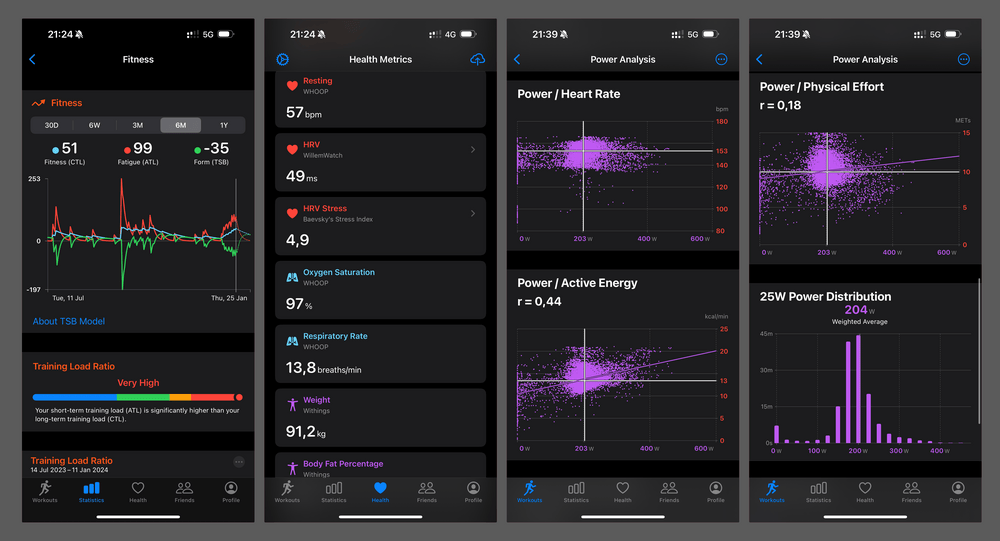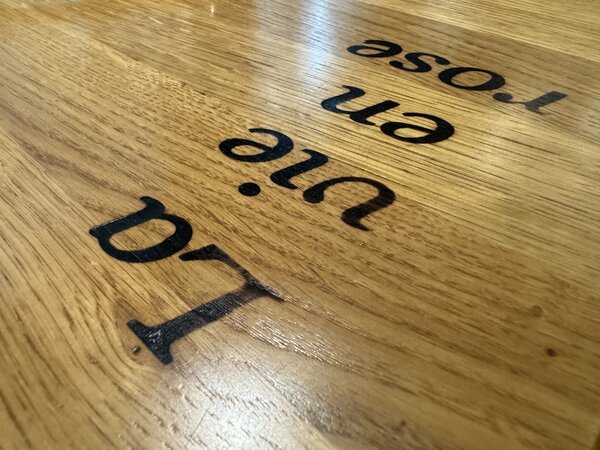Jan. 16, 2024
Health and fitness data
Is more better?
Since the start of this new year I am working out harder than the previous months. I have set some goals for myself and have taken on a training scheme incorporating running, cycling and swimming. As I sift through the growing mountain of workout data, I find myself questioning: does having more data truly translate to better fitness outcomes??
Feeling your performance
The thing with working out is that once you make a habit of it, you'll recognise and understand your own feeling better and better. I have been riding my bicycle for some years now and I can quite accurately estimate my current heart rate within just a few beats per minute, the same goes for speed and intensity as measured by my power meter. I'd say that data holds very few secrets to me when it comes to cycling.
Learning to Run
Yet, I am new to running and collecting some metrics such as distance, time and heart rate allows me to gauge my stamina, pace and progress. But, perhaps as an echo of my cycling experience, I noticed that I recognise my own performance once I get in "the flow" after some time in. More importantly, the real pain I experience is not measured by any digital tracker, it comes from my untrained knees and related muscles: I can only feel this (and I'd better listen to it, to prevent an injury!). So, health and fitness data only gets me "so far" when it comes to running.

Macro versus Micro data
Honestly, I have to admit that I do not know where the sweet spot is when it comes to health and fitness data. My WHOOP band passively keeps an eye on broader trends and it has detected an improvement in resting heart rate and HRV since I began my intensified training. I like its somewhat more holistic approach, focusing on macro instead of micro: you'll see your progress on a broader horizon. But it, too, only seems to capture a part of the picture of me feeling better.
What does "feeling better" mean?
When you think about health and happiness, remember that while tools like psychological scales and biometric measures can offer insights, they often fall short of capturing the full spectrum of your personal experience. The most authentic barometer of your well-being and happiness is your own self-awareness.
Tune into your body's signals and your mind's reflections. Are you feeling energised or drained? Content or restless? These internal cues are invaluable. Embrace a habit of regular self-check-ins, perhaps through mindfulness or journaling, to deeply understand and appreciate your own state of well-being. This self-attuned approach not only respects the uniqueness of your experiences but also empowers you to make adjustments that truly resonate with your personal needs and aspirations.

Conclusion
I think that it probably comes down to personal preference and your own goals. If you're a professional athlete trying to win a race or beat a (personal) record, then it makes sense to collect detailed data in order to unlock a few more bits of human performance. In the end, for me it's about feeling connected to my body rather than being tethered to a database.
Let me know!
I would love to hear from you on your "fitness philosophy". How do you balance between data and intuition? Do you track anything, if so, why? Drop me a mail via mail@willem.com and/or please send me your links, thoughts, ideas and graphs. I intend to write a follow up on this with your feedback!

Download
If you enjoy reading offline, this article is available for download:
Translations
This article is available in the following languages:
RSS / Atom
Grab one of the feeds to stay up to date, the feeds contain the full posts:
